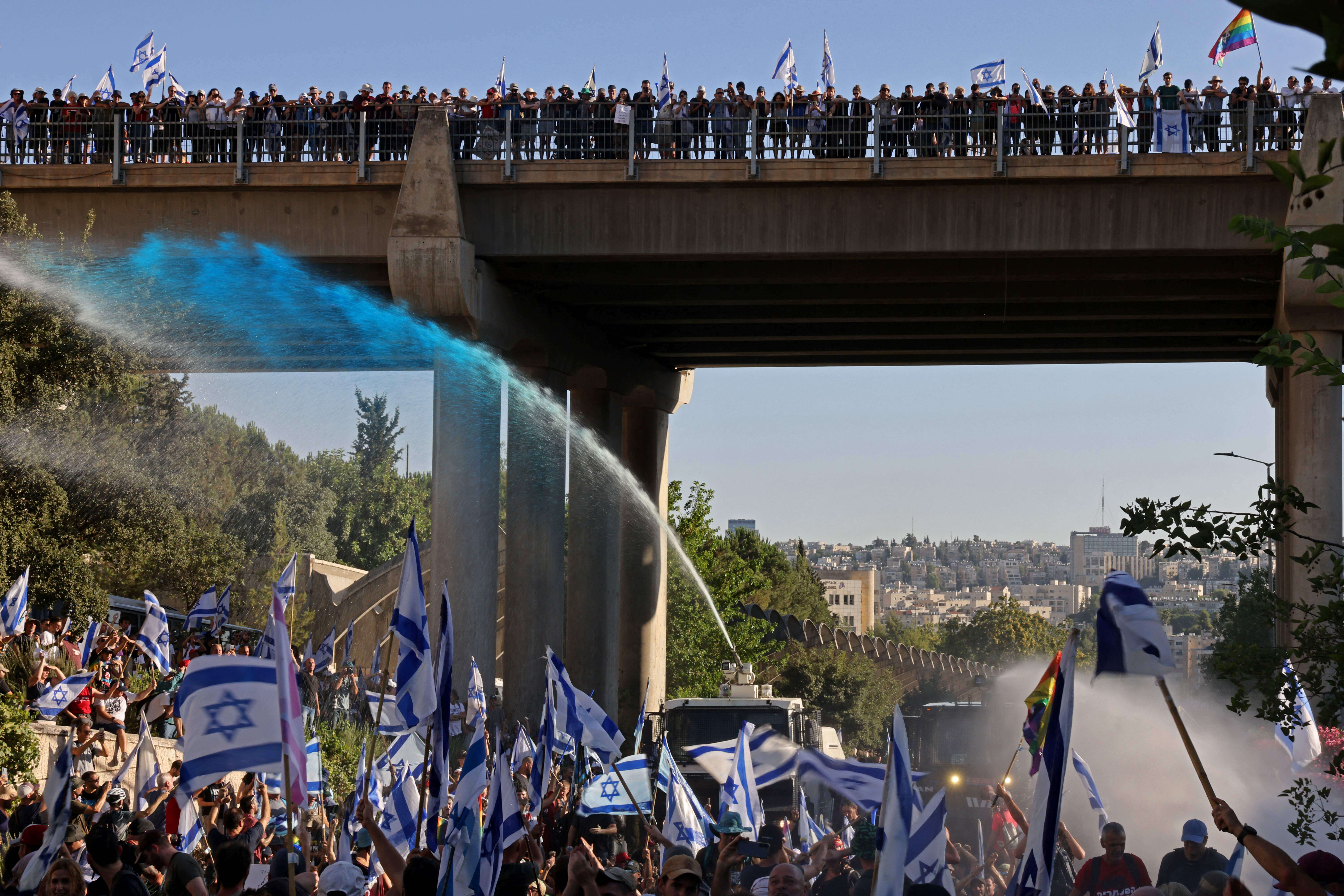‘You just feel devastated; people are leaving in a state of complete depression’ — the view on the ground from a poet in Israel
Yudit Shahar is a veteran of many protests; she says this one feels different

Israeli security forces use a water cannon to disperse demonstrators blocking the entrance of the Knesset, Israel’s parliament, in Jerusalem on July 24, 2023. Photo by Getty Images
For many Israelis, the story of the judicial overhaul has been a watershed moment. This is especially true for writers.
A quote from the late Israeli literary icon Amos Oz has been widely shared on social media, in various languages, and it captures the sense of protest among the literary community. “If you see a huge fire, get a bucket of water and throw it on the fire,” Oz wrote. “If you don’t have a bucket, bring a glass, and if you don’t have a glass, use a teaspoon, everyone has a teaspoon.”
I spoke with poet Yudit Shahar, who has a long record of writing about economic and social justice — and who is a veteran of many protests — about the mood right now in Israel, why these protests are different from other protests, and how the literary community is reacting. Our interview was conducted in Hebrew. I’ve translated it into English and edited for length and clarity.

What’s the mood in Israel right now? What does it feel like on the street?
It depends on who you are talking to. There are fanatics who are interested in dictatorship, and they are dancing right now. But people in the middle and intellectuals are completely devastated. My sisters, my friends, are constantly protesting. Especially for people who are my age, who grew up after the establishment of the state of Israel, who grew up on the ethos of Zionism and the idea that Jews, too, deserved a home of their own — that dream of Herzl, that democratic socialist country — it has been awful to witness.
I should say that my heart is widened by how many young people are participating in these protests, including my children.
You have been to a lot of protests in your life, for all sorts of issues. How are these protests different?
I am always at protests. I used to go to protests in Tel Aviv and heard this — tze’uh m’hamirpeset, hamedina koreset — get off the porch, the country is crumbling. There used to be a few thousand people protesting. Now it’s the entire country protesting, more than half a million people. Because this isn’t just a fight over the cost of living (there were massive protests in Tel Aviv over the cost of housing in 2011, with about 400,000 people). This is a fight over our lives.
When you’re at a protest, you often feel uplifted because you are surrounded by people who are like you. You feel better. But this time, it’s different. You go to a protest, but you just feel devastated.
For example, last night I was at a protest of writers in Gan Paamon in Jerusalem, where we read Megillat Eichah — the Book of Lamentations. We tore our clothes.
I read the last verse of Lamentations. And I really, in my heart, said, “Where is God? Why am I reading this text? They are criminals, they are looking at me and laughing.”
This government is not taking care of health, or the economy, or the high cost of housing, or the postal service. It’s just sitting there and making laws to destroy rights.
What about violence at protests?
The people who are protesting are the nice people, the good people, the intelligentsia. But the police have become more violent, and there are also fascist groups that are milling around and hitting people. The environment has become more dangerous.
My son caught some blows at a protest. But what is there to do, to lose my home to a dictatorship? There is a terrible sadness, a horrible anger, that they took my home and my country.
You have been saying for years that the level of hatred in Israel has been rising.
I teach at-risk youth. And I had a student who was 14 or 15 years old tell me that if he sees a leftist in the street, he will cut him with a knife, from the top to the bottom. That phrase — hasmolanim bogdim — leftists are traitors — has done a lot of damage.
I know who established this country: the left.
That incident with my student was 14 years ago, and that was when I understood what was happening. The other students had no issue with what that student was saying. From their perspective, it was a normal thing to say because that’s what the prime minister was saying.
How has the judicial overhaul — and the protests against it — affected writers in Israel?
I see a lot of writers out protesting. This government wants to take everything from us. In Israel, literary prizes are the only way for most writers to survive, because royalties are not enough. All these prizes are swinging to the right. They are now requesting a declaration of loyalty to get a prize — so of course that will have an influence on writers’ lives.
In the past, writers in Israel received percentages from the libraries, a small amount for each borrowed book. And this year, that has been canceled. We got nothing.
So a lot of people will flee. They are already leaving. It’s terrible. People are leaving in a state of complete depression.

















